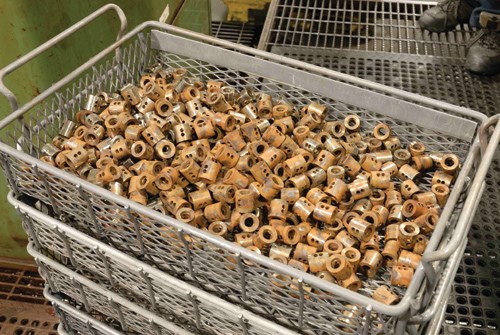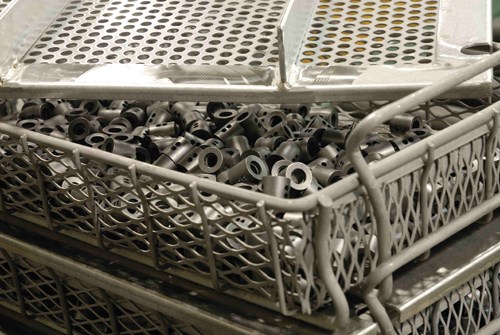Tight Specs for Parts Cleaning
Any time a part is machined, the oil or grease from the machining process as well as the chips present from the grinding process need to be removed before further part production takes place.
Any time a part is machined, the oil or grease from the machining process as well as the chips present from the grinding process need to be removed before further part production takes place. Otherwise, residue and chips inhibit later manufacturing processes, whether they are performed in-house or at an outside manufacturer. While there are many parts cleaning systems on the market, the challenge for machine shops is finding a system that cleans parts thoroughly, inexpensively and safely.
American Turned Products (ATP), with locations in Erie and Fairview, Penn., is familiar with the challenges of cleaning machined parts to tight specifications in a cost-effective and environmentally sensitive manner. The company welcomes the opportunity to manufacture complex parts to extremely close tolerances. It strives for a rejection rate of zero parts-per-million, therefore, it is understandable that they would need parts cleaning solutions to help them meet these demanding requirements and close tolerances.
As Harry Eighmy, ATP’s chief operating officer, says, “Customers not only want to see how you’re going to manufacture their components, but also how you’re going to clean them. A lot of them said, ‘You have a decent cleaning system, but it’s not robust enough to meet our requirements.’”
ATP’s two facilities in Erie County contain more than 125 metalworking machines in more than 90,000 square feet of manufacturing space. The company pursues high-volume precision machining and assembly contracts in the automotive, hydraulics and heavy off-road equipment industries. Though the majority of its volume comes from a Tier II and Tier III supplier, manufacturing fuel injection, engine timing, airbag and braking systems components from standard and exotic steels for the North American automotive market, the company also exports these to China and other foreign countries.
By late 2006, ATP had been using aqueous parts cleaning systems in their two plants for about 10 years. These systems were efficient for their generation, but ATP found that they did not meet the most modern requirements for the market. The parts cleaning system that it used for cleaning parts that came from their thermal deburring unit sometimes left a chalky or milky film on the parts. This variation in cleanliness caused unacceptable production delays and cost run-ups for the company, which prompted Mr. Eighmy to look closely at the processes and systems that the company was using for parts cleaning.
During a 16-month period that began in late 2006, Mr. Eighmy and the ATP employees put considerable time into their search for the right parts cleaning systems from a variety of manufacturers. Eventually, they found that Dürr Ecoclean compared favorably with other manufacturers both in terms of overall parts cleanliness and the environmental impact of the parts cleaning systems. Not only did they meet or exceed cleanliness requirements from customers, but in comparison with other aqueous systems, the Universal 71W aqueous system used a lot less water during its operation and consequently generated much less waste for disposal.
Also, Mr. Eighmy was pleased with how self-contained the aqueous systems from Dürr Ecoclean are. With the other systems, there was always something to be added (detergents, degreasers, chemicals) or drained from the system during operation, he adds. Furthermore, the Dürr systems use less space compared with other cleaning systems, according to Mr. Eighmy.
In 2008, ATP purchased three parts cleaning systems for its two plants—one Dürr Ecoclean Universal 71W aqueous parts cleaning system and two Universal 81C solvent-based systems. The Universal 71W system was purchased to remove residue and rust-colored oxide remaining on the parts from the thermal deburring process at the Fairview plant. The Universal 81C systems were purchased to remove machining oils from the parts at both plants and to prepare some parts at the Fairview plant for the thermal deburring process. Mr. Eighmy and the staff were satisfied from the start with the level of cleanliness on its machined parts that were cleaned with all three systems.
The Universal 71W is a cleaning system using an immersion process and aqueous media in all cleaning stages. A vacuum drying system completely dries cleaned parts and significantly reduces the possibility for rust and oxidation on steel components, and the machine’s final step gives them a rust protection coating prior to packing. The Universal 71W put into service at the Fairview plant consistently de-rusts steel parts that are coated with oxides from their thermal deburring process. Thanks to this vacuum drying and chemistry change, the chalky film that occasionally appeared on parts cleaned with their former aqueous washer was no longer present.
The Universal 81C cleaning systems use non-halogenated hydrocarbons as highly effective cleaning media and allow the safe and economical use of solvents for removing oils, greases, emulsions and chips between or after manufacturing processes. On account of its many different process variants using hot and/or cold immersion with downline vapor degreasing, the technology of the Universal 81C is ideal for meeting the requirements expected of modern manufacturing processes with regard to quality and functionality.
The two Universal 81C systems the company put into service allowed it to meet cleanliness specifications that could never be met with its former aqueous system. The fuel injection components meet strict ultrasonic testing requirements for the minimum number of particles on workpiece surfaces.
The results speak for themselves: To this point, no parts have failed customer cleanliness tests, and Mr. Eighmy is pleased to report that all the Dürr Ecoclean systems in place are effective on a consistent basis.
In addition to being pleased with the cleaning results, Mr. Eighmy and the team at ATP had only positive things to say about Dürr Ecoclean’s customer service. ATP was more than satisfied with the speed of installation, the training process and Dürr’s customer support. The Universal 81C, for example, was delivered on a Monday, the Dürr tech support personnel trained the employees, and they were using the machine in production on Wednesday.
Further-more, the costs associated with the project were significantly less than expected when the speed of the installation, the thorough training and Dürr’s responsiveness are considered.
When it comes to maintenance and operating issues with any of the three new parts cleaning systems, Mr. Eighmy points out that he can count on one hand the number of times he had to call Dürr Ecoclean for troubleshooting or had to have a technician come in and do something they couldn’t do themselves. Not only are the systems reliable, but the ATP personnel have been trained well enough by the technicians to be able to troubleshoot any technical operating issues that have come up.
On his overall satisfaction with the Dürr Ecoclean systems, Mr. Eighmy has a solid recommendation for other manufacturers. “If you are looking to benefit your company and exceed your customers’ and suppliers’ expectations, these systems are meeting and exceeding the current requirements along with providing a cleaner environment,” he says. These days, questions about the environmental impact of plant operations are being more closely scrutinized, as they also have an impact on financial balance sheets. Parts cleaning systems such as the Universal 81C and Universal 71W are environmentally friendly, while also delivering clean, rust-free parts.
Related Content
Sita’s CleanoSpector Measures Part Cleanliness
PMTS 2023: Handheld measuring device checks for cleanliness of parts to assure product quality as well as prior to follow-up processes.
Read MoreMeeting Stringent Cleaning Goals With Modular Ultrasonic System
A knee implant manufacturer implements an advanced cleaning system that meets its tight cleaning requirements, including documenting, validating and tracing the entire cleaning process.
Read MoreOvercoming 3 Common Challenges With Automated Particle Counting
Facing difficulties while performing particle analysis is normal but should not be discouraging. Here are some ways to handle the most prevalent issues that can arise.
Read MoreVersatile Sandblasting for Deburring Intricate Geometries
PMTS 2023: Comco’s MicroBlasting sandblasting systems can deburr, texture and clean small, intricate parts.
Read MoreRead Next
Simple, Effective Parts Cleaning
After trying an array of parts cleaning methods over the years, this shop has implemented an environmentally friendly, relatively simple system to clean every part it produces.
Read MoreParts Cleaning in a Vacuum
While not glamorous, cleaning is a necessity for quality parts production. This supplier provides a solution to many of the issues shops face for fast, effective and environmentally friendly parts cleaning.
Read MoreEmerging Leaders Nominations Now Open
Here’s your chance to highlight a young person in your manufacturing business who is on the path to be a future leader moving your company forward.
Read More

























